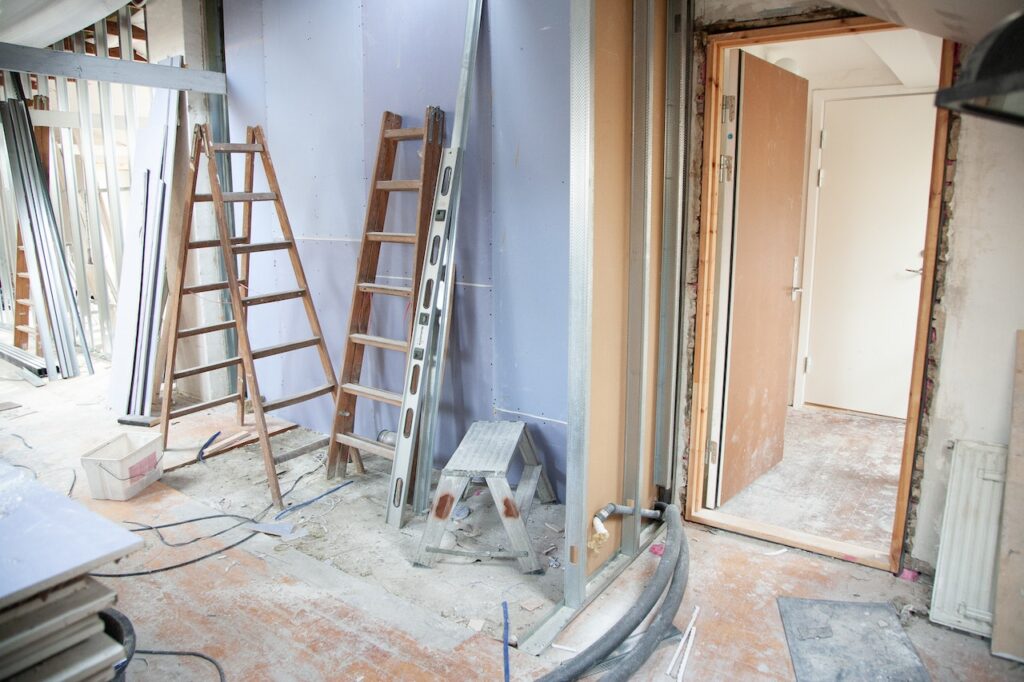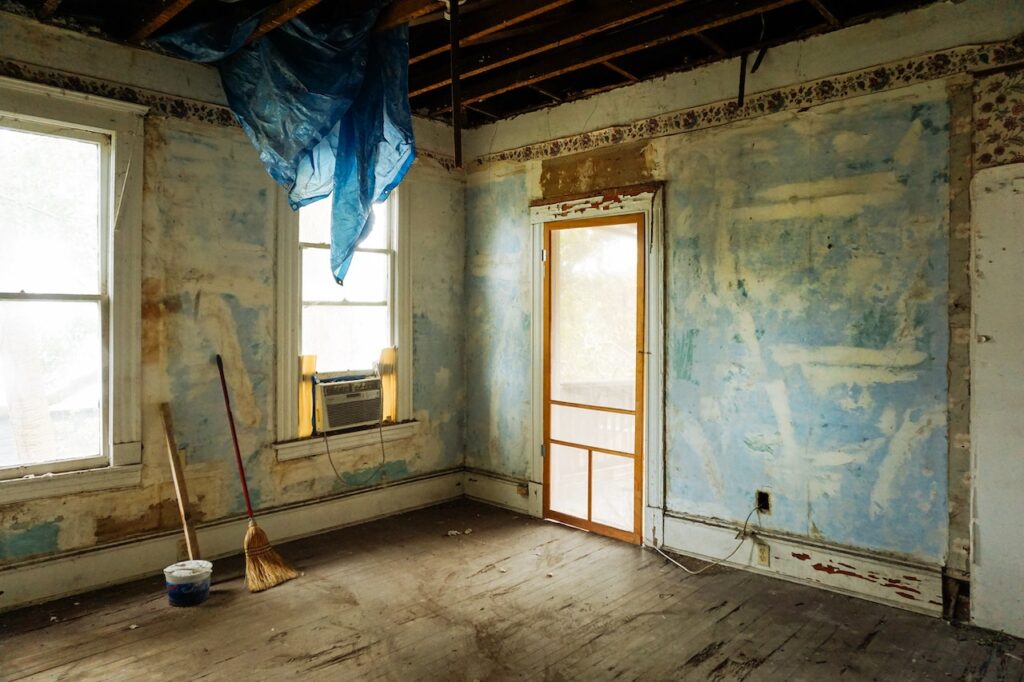Handling the complexities of a water damaged house can be a harrowing experience, rendering the property unsuitable for both living and conventional selling. How to sell a water damaged home becomes a pivotal question for homeowners facing this situation. With the intricacies of repairing and renovating such properties, coupled with stringent disclosure laws, homeowners often find themselves at a crossroads.
Natural disasters and floods can wreak havoc on properties, causing severe structural damage. The force of these events can compromise foundations, walls, roofs, and electrical systems, leaving homes vulnerable and unsafe. Immediate assessment and repairs are crucial to ensure the safety and stability of the property.
From the arduous path of restoration to the path of least resistance through an as-is sale, this article will equip you with the knowledge needed to navigate the challenge of selling a house with water damage with confidence and clarity.
Assessing the Damage & Flood Risks
When confronted with water damage, a comprehensive assessment is the crucial first step involving a thorough evaluation of the destruction. Armed with this knowledge, sellers can make informed decisions about repair options, pricing strategies, and the overall direction of their selling journey.
Evaluate the Extent of Water Damage
Meticulous inspection is essential to gauge the scope of damage. From compromised structures to mold proliferation, understanding the magnitude of the issue informs subsequent actions.
Identify Potential Issues
Unveiling hidden structural weaknesses, electrical hazards from water exposure, and potential fire risks becomes paramount. Identifying concerns like leaking pipes and cosmetic deterioration aids in determining repair needs.
Complications of Selling a House in a Flood Zone
Properties located in a flood prone area face unique challenges in the selling process. Understanding flood risks that impact flood zone properties is pivotal. This ranges from potential damage to foundations, basements, and landscaping due to flooding. Property owners may have to equip the water damaged house with flood gates or removable flood barriers to prevent the intrusion of flood water.
Having comprehensive flood insurance can be a protective shield against unforeseen financial burdens, especially in flood prone areas. Real estate agents strongly advise investing in flood insurance as it safeguards against damage-related expenses alongside enhancing the appeal of a property by offering potential buyers peace of mind.
Selling Strategies for a Water Damaged House
When it comes to navigating the dilemma of how to sell a water damaged home, exploring the labyrinth of options is essential for a successful transaction. Let’s delve into the array of selling strategies, each offering unique advantages and considerations.
Repair and Renovate
Repairing water damage is a comprehensive undertaking, involving meticulous assessments, water extraction, dehumidification, and repairs. Restoration professionals play a crucial role in reviving the property’s structural integrity and aesthetic appeal.
Renovating water damaged homes presents crippling financial burdens and considerable hassle. The costs of necessary repairs can quickly escalate, and overseeing renovations involves juggling contractors, timelines, and unforeseen challenges. Disclosure guidelines and liabilities prevent sellers from undertaking any strategies to hide water damage from potential buyers.
Water damage often reveals a litany of hidden structural and cosmetic defects. From compromised foundations and leaking pipes to mold infestations and fire hazards, the list of required repairs can demand significant investment. Unfortunately, despite substantial efforts, there’s no assurance of a profitable sale post-renovation, as the market’s response remains uncertain.
Sell with Disclosure
Selling a water damaged house with full disclosure is a strategy rooted in transparency and ethical dealings. This approach entails openly sharing the property’s water damage history with potential buyers to ensure informed decision-making.
In Tennessee, sellers are legally obligated to disclose any known water damage issues to potential buyers. These disclosure laws underscore the significance of providing accurate and comprehensive documentation of past water damage incidents, protecting the interests of both buyers and sellers.
While transparency is commendable, it can lead to challenges such as reduced listing price. Buyers may factor in the costs of repairs and renovations, resulting in offers that don’t align with sellers’ expectations. Moreover, finding buyers willing to undertake substantial renovations can be difficult, potentially prolonging the sale process and introducing uncertainties.
Selling As-Is
Amid the complexities of selling a house with severe water damage, the approach of selling it as-is offers a breath of relief. This strategy involves selling the house with water damage, without spending a dime on repairs or renovation.
This strategy liberates property owners from the substantial financial burdens of repairing and marketing water damaged homes. Moreover, the prospect of a speedy cash bailout offers a lucrative avenue to recoup one’s real estate investment without pouring more money into a distressed property.
The financial impact of a quick sale can empower homeowners to transition into a new chapter, investing in a property free from the shadow of water damage. Another advantage lies in the potential for a quicker sale, as the absence of repair time can streamline the process. Buyers seeking fixer-uppers or real estate investors attracted to the property’s potential may be more inclined to close the deal swiftly.
If you’re intrigued by the prospect of selling your water damaged house as-is and securing a timely cash bailout, our team is here to guide you. Reach out for a property evaluation that paves the way for a seamless transition, allowing you to embark on a fresh journey unburdened by the challenges of water damage.
Steps to Take Before Selling a House with Water Damage
Selling a house with water damage requires careful preparation. Here’s a breakdown of essential steps to take upon discovering signs of water damage or after a natural disaster:
Document the Damage
Take detailed photographs and notes of the damage after inspecting the entire house. This documentation serves as crucial evidence during negotiations and disclosures.
Seek Professional Evaluation
Engage experts to assess the flood damaged house comprehensively. Their evaluation will help estimate repair costs and potential resale value. If you’re considering repairs, gather estimates from reputable contractors. Homeowners with flood insurance should examine the insurance coverage while evaluating repair and renovation costs.
Consult a Real Estate Agent
Partner with a seasoned real estate agent who specializes in water damage sales. Their expertise will help you navigate complexities and make informed decisions. It’s wise to consult real estate agents to determine an appropriate listing price. Pricing should reflect the property’s condition while leaving room for negotiations.
Anticipate negotiations centered around the property’s condition. Be open to reasonable offers and flexible in finding common ground, and enlist the support of your real estate agent.
Final Thoughts
Navigating the process of listing, marketing, and selling a water damaged house is no small feat. The challenges of repairs, disclosures, and finding the right buyer can be overwhelming. Amidst these hurdles, the option of selling the property as-is stands as a beacon of relief.
By opting for an as-is sale, you free yourself from the intricate web of repairs, lengthy marketing, and uncertain negotiations. At My Tennessee Home Solution, we offer distressed homeowners a streamlined path to a fresh start. If you’re ready to bypass the complexities and secure a cash bailout, take the first step.
Fill out our form and schedule an initial evaluation. Let us present you with a cash offer, providing the swift solution you need to move forward confidently.





